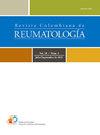佐剂诱发自身免疫/自体发炎综合征(AIAIS)患者的临床和实验室检查结果及预后
Q3 Health Professions
引用次数: 0
摘要
简介和目的 佐剂诱发的自身免疫/自身炎症综合征(ASIA)表明,接触不同的佐剂(如硅酮或某些疫苗中用作赋形剂的铝)会导致出现不同的症状。材料和方法 对 13 例与硅胶植入物和疫苗有关的 ASIA 综合征患者的临床表现、实验室指标、治疗和演变进行了回顾性分析。结果 10 例(77%)患者有硅胶植入史,其余患者有疫苗接种史。硅胶假体患者最常见的症状是雷诺现象(72%),而有疫苗接种史的患者最常见的症状是关节痛和肌痛。一名患者符合原发性斯约格伦综合征的标准,另一名患者则患有局限性系统性硬化症和相关的斯约格伦综合征。结论雷诺现象和骨骼肌症状分别是有乳房假体和疫苗接种史的患者最常见的表现。本文章由计算机程序翻译,如有差异,请以英文原文为准。
Hallazgos clínicos, de laboratorio y evolución en pacientes con síndrome autoinmune/autoinflamatorio inducido por adyuvantes (ASIA)
Introduction and objective
Autoimmune/autoinflammatory syndrome induced by adjuvants (ASIA) suggests that contact with different adjuvants such as silicones or aluminium used as excipient in some vaccines can cause the appearance of different symptomatology.
Materials and methods
A retrospective analysis of the clinical manifestations, laboratory parameters, treatment, and evolution of a case series of 13 patients with ASIA syndrome related to silicone implants and vaccines was performed.
Results
In 10 (77%) of the patients there was a history of silicone implants, in the rest of the patients there was a history of vaccination. The most frequent symptom in patients with silicone prostheses was Raynaud's phenomenon (72%), while in patients with a history of vaccination, arthralgias and myalgias were the most frequent symptoms. One patient met the criteria for primary Sjögren's syndrome while another patient had limited systemic sclerosis and associated Sjögren's syndrome. Most of the patients had elevated acute phase reactants (61%), while in the group of patients with a history of silicone prosthesis 60% presented positivity for antinuclear antibodies.
Conclusion
Raynaud's phenomenon and skeletal muscle symptoms were the most common manifestations in patients with breast prosthesis and vaccination history, respectively.
求助全文
通过发布文献求助,成功后即可免费获取论文全文。
去求助
来源期刊

Revista Colombiana de Reumatologia
Medicine-Rheumatology
CiteScore
0.80
自引率
0.00%
发文量
92
期刊介绍:
The Colombian Journal of Rheumatology (Revista Colombiana de Reumatología) is the official organ of the Colombian Association of Rheumatology (Asociación Colombiana de Reumatología) and the Central American, Caribbean and Andean Association of Rheumatology (Asociación Centroamericana Caribe Andina de Reumatología) - ACCA. It was created in December 1993 with the purpose of disseminating scientific information derived from primary and secondary research and presenting cases coming from the practice of Rheumatology in Latin America. Since its foundation, the Journal has been characterized by its plurality with subjects of all rheumatic and osteomuscular pathologies, in the form of original articles, historical articles, economic evaluations, and articles of reflection and education in Medicine. It covers an extensive area of topics ranging from the broad spectrum of the clinical aspects of rheumatology and related areas in autoimmunity (both in pediatric and adult pathologies), to aspects of basic sciences. It is an academic tool for the different members of the academic and scientific community at their different levels of training, from undergraduate to post-doctoral degrees, managing to integrate all actors inter and trans disciplinarily. It is intended for rheumatologists, general internists, specialists in related areas, and general practitioners in the country and abroad. It has become an important space in the work of all rheumatologists from Central and South America.
 求助内容:
求助内容: 应助结果提醒方式:
应助结果提醒方式:


